Feminists We Love: Jessica Luther ~ Activist, commentator, and change agent
I am not sure when and where I first came in contact with Jessica W. Luther and her work, but ever since that moment I have been continually impressed by her brilliance, her passion for justice, her honesty, and her commitment to realizing “freedom dreams.” From her brilliant sports writing and her twitter activism, from her organizing in Texas to her involvement with struggles for reproductive justice, she is doing amazing work. Her writings have appeared in a range of publications – The Guardian, The Atlantic, Sports on Earth, Power Forward, and The Nation. Her work on sexual violence and sports culture illustrates the kind of work she is doing that is timely and impactful, demonstrating the interface between sports culture and the fight against sexual violence on and off America’s college campuses. She consistently uses sports as a site of exploration and expansion of these important conversations all in effort to raise awareness and prompt action. “In the end, whether or not Jameis Winston is guilty, we know he is deeply invested in a football culture that is incredibly problematic, especially where it intersects with rape culture. Football culture clouds our ability to see him as anything other than a famous kid with a nice-guy persona and amazing athletic skills,” wrote Luther. “Rape culture demands that we mistrust the victim, question her credibility, and try to poke holes in her story. It creates this familiar narrative in which people who have invested their own hopes and dreams in Winston claim his innocence immediately and refuse to hear anything else.” On a given day she is taking on the NCAA; the next, she is organizing for Wendy Davis or challenging Republicans in the Texas legislature. This is why we love Jessica Luther – her willingness to speak truth to power, to demand accountability, and to inspire action. She is a feminist we love and someone who represents the future and its possibilities.
*****
DJL: You are one of my favorite sports writers because of the depth, analytical frame, sports knowledge, and passion you bring to your writing. Do you think of yourself as a sports writer/commentator or someone who writes and interrogates sports?
JL: Thank you! I would consider myself someone who writes about culture through the lens of sports, rather than a sports writer (though I’d never eschew that title). I think sports are an amazing cultural lens because they allow us to interrogate issues like masculinity or gender roles that are very blatant or obvious in ways that they aren’t in other parts of our culture.
DJL: Often times being a fan of sports is seen as incompatible with feminism – would you consider yourself a feminist sports fan? What does this entail?
JL: I am a feminist sports fan. I am a feminist anything. That’s a hat I can’t take off.
Of course, being a feminist sports fan is hard a lot of the time. While watching a game, commentators – who are almost exclusively men unless you are watching women’s sports – often assume that the audience is just men or they actually make sexist comments (I’m thinking of Brent Musburger’s famous “boys, make sure you play quarterback so you can get a hot girlfriend” statement during the Alabama football championship game a couple of years ago). The ads around sports are sexist, too. There is a lot of eye rolling and righteously angry tweeting that happens while I am watching that helps me process it all.
A big part of the process of being a feminist sports fan is setting expectations nice and low. It’s about preparing for the inevitable let down and dealing with the disappointment when the letdown happens even though you’ve prepped for it. And it’s a lot of waving my arms wildly above my head and screaming on a regular basis, “I am here! Women are here!”
DJL: What athletes do you look up to or admire and why?
JL: I love Brittney Griner. I mean, I LOVE her. I love how she plays ball. I love how she is out and proud and using her platform as the most famous female ball player to advocate for LGBT youth. I love how vulnerable she allows herself to be when she talks about herself and her personal life.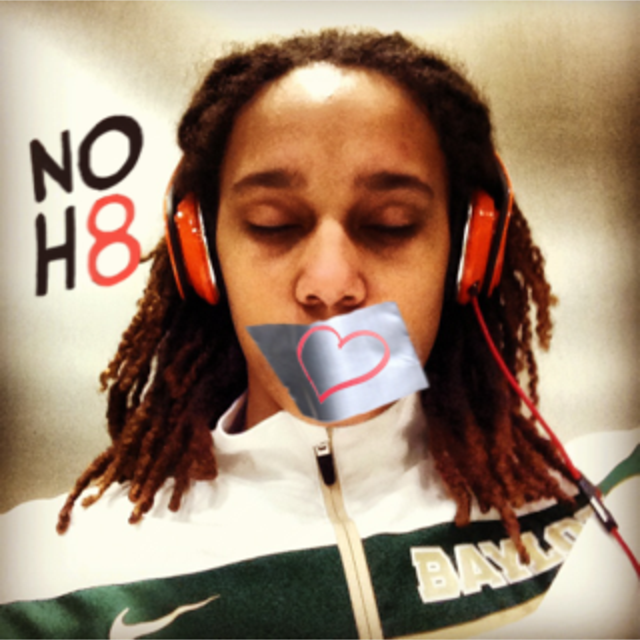
I admire any athlete who goes against the stereotypes of athletes: Michael Sam is amazing, Richard Sherman should never stop talking, and Kevin Durant should be given the stage as much as possible to talk so openly as he did in his recent NBA MVP awards acceptance speech about his love for his teammates and his mother. It’s easy (trust me) to focus on sports players who do bad things and are poor role models. I deeply appreciate those who deserve to be praised both on and off the court.
DJL: Why do you think progressive movements and academics have neglected sports?
JL: There are probably a lot of different reasons. I find both progressive spaces and academia often have a sort of snobbery attached to them or, at least, that they project and sports are painted as common, obvious, or simple. On top of that, sports writers, by and large, recap events or offer predictions about what will happen. The extent of the analysis is often tailored to a narrow audience of diehard fans and number crunchers.
And as a friend pointed out to me the other day, academics often find themselves in adversarial positions to athletic departments, especially when it comes to who receives financial, administrative, and alumni support.
There’s also a part of me that suspects that progressives and academics, like most of us, are sports fans who don’t want to pick apart the major and often problematic cultural issues that are deeply embedded in a space that they may see as their escape. A “no mixing business and pleasure: deal.
That’s changing now with the amount of media space available out there. There is now much more room for people who are doing the work of analyzing sports and culture. And that extends into progressive spaces (Travis Waldron at Think Progress, Dave Zirin at The Nation, etc) and within the academic community. I know that here in Austin at the University of Texas, the College of Communications now has a program in sports and media and have people who are working hard to show academics how the work they already do can be used to analyze this very important part of our culture.
DJL: What piece of yours has been important to you? Why?
JL: For my sports writing, it was definitely a piece I wrote late in 2012 for my blog titled “Serena Williams Is Not A Costume.” Not only do I love Serena Williams and tennis (it is generally my favorite sport to watch and she my favorite player) but that piece allowed me to grapple with an issue that is always under the surface in tennis these days: race. 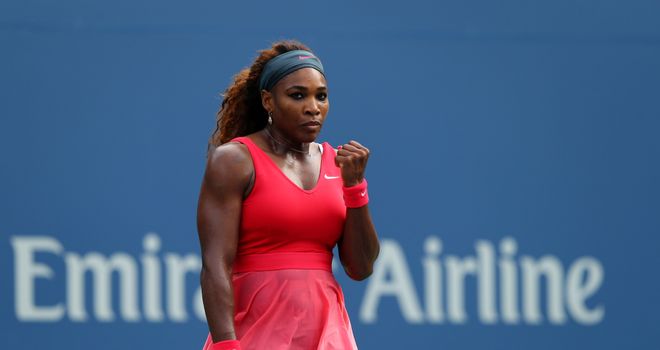 It’s such a historically white sport, one still that is very white (after Andy Murray won Wimbledon, there were a lot of jokes on social media about the whiteness of the crowd there that day). I still think what Caroline Wozniacki did that day by dressing up as Serena and mimicking Serena’s body was wrong and I stand by the post. But more than that, the piece allowed me to address something that had been bothering me for years about tennis commentary: namely the minor obsession with Serena’s body generally and the level of scrutiny she has faced in the sport because her body is different from the vast majority of women who play the sport.
It’s such a historically white sport, one still that is very white (after Andy Murray won Wimbledon, there were a lot of jokes on social media about the whiteness of the crowd there that day). I still think what Caroline Wozniacki did that day by dressing up as Serena and mimicking Serena’s body was wrong and I stand by the post. But more than that, the piece allowed me to address something that had been bothering me for years about tennis commentary: namely the minor obsession with Serena’s body generally and the level of scrutiny she has faced in the sport because her body is different from the vast majority of women who play the sport.
To this day, people I talk with are familiar with that piece because of the way it traveled quickly around the interwebs. It was nice to have some influence in the conversation around this topic and about my favorite athlete in my favorite sport.
DJL: You decided to leave academia; what prompted this decision?
JL: Oh, wow. So many things. I went straight into graduate school many years ago after undergrad. I got a Masters in Latin Literature at UT but had a hard time in the Classics department so transferred over to the UT History department in my third year. It took a while to find my place there and to decide what area I wanted to study. Once I did, personal stuff happened. I was well into my pregnancy when I did my comprehensive reading exams. I went straight back into grad school, hiring a tutor when my son was only 6 weeks old so I was prepared to take and pass my language exam upon returning. Then my entire dissertation experience was coupled with my time as a mom, which was hard in a lot of ways, including (and maybe especially) my ability to do the research I needed to do to be responsible to the project. Plus, I became politically active in the last years of my dissertation work, started freelancing, was thinking of what I wanted my life to be post-graduation, and realized that my life goals didn’t line up anymore with having a PhD.
There was also the ongoing issue of the culture of the academy. I worked personally with a bunch of phenomenal people and I will forever be grateful for that. But the politics in the academy, especially in a space where stakes are generally pretty low, can be brutal. They can be personal. Things can run hot in your favor until suddenly you hit a wall of cold ice. My mental health suffered and it became clear to me that something needed to change if I wanted to restore my health and that turned out to be leaving graduate school all together.
DJL: You have very involved with organizing in Texas, especially with respect to Wendy Davis’ campaign – what’s at stake with this upcoming election?
JL: What isn’t at stake? Texas has major problems and seeing as the (often super) conservative politicians have been in charge for decades, we need new leadership. We need Medicaid expansion. We need laws that begin what will be a long, slow rollback on the damage done by voter ID laws, anti-abortion laws, anti-reproductive health care laws, anti-regulation laws, etc. We have a culture and laws that are hostile to immigrants.  We have roads being converted from pavement to rock because the state government won’t pay to maintain the former. We have incredibly high uninsured numbers, high rates of teen pregnancy, high rates of poverty, and high rates of income inequality. Our legislature keeps cutting funding to education. There is just so much to do. And part of the uphill battle is that we have a long history of gerrymandering (I mean, Tom Delay started here) and the lowest voter turnout in the country.
We have roads being converted from pavement to rock because the state government won’t pay to maintain the former. We have incredibly high uninsured numbers, high rates of teen pregnancy, high rates of poverty, and high rates of income inequality. Our legislature keeps cutting funding to education. There is just so much to do. And part of the uphill battle is that we have a long history of gerrymandering (I mean, Tom Delay started here) and the lowest voter turnout in the country.
DJL: On social media, you talk some about parenting and how your politics influences your parenting choices. What advice would you give to those who want to integrate feminist sensibilities and anti-racist practices into their parenting?
JL: I think on its face it is simple: be honest and be willing to talk about the hard stuff. I question my child’s assumptions about race, about gender, about sexuality, and make him talk through why he says something. Of course, to do any of that, though, you have to be willing to self-police your own sensibilities and practices: your child, if you teach them, will call you out on the sexist, racist, classist, transphobic, heterosexist stuff you say (though, of course, not in that language).
DJL: Did you see this piece on Slate entitled, “How White Parents to their kids about race”. I am wondering if you could respond to this piece and give some thoughts on how parents should talk to their kids about race, gender, sexuality, and class?
JL: I really like the part of this article that says you can’t just shy away from the cringe-worthy comments your kids make. You have to call them on it immediately by questioning their assumptions and making them aware that they are bringing assumptions to the table. I am a fan, generally, of too much information. My 5-year-old has already heard me wax philosophical about the role of slavery in our history and how that makes people judge black people more harshly and without reason. He and I talked specifically about Donald Sterling’s recent comments and why I thought they were wrong. I will stop a movie or TV show or reading from a book to have a discussion about why the characterization of one character is a problem and discuss alternatives to it.
And honestly, he’s 5. Too much info means that he often gets bored with the conversations before it gets really difficult. But when it does get difficult or if I honestly am unsure how to answer his probing questions about these issues, I tell him that. I tell him that he has stumped me and I’m going to have to think about it. And I’m upfront that these are hard things to talk about, to think about, etc. He’s always ok with that.
DJL: The South, and Texas, is often imagined as “more racist,” more sexist, and countless other caricatures. What are the dangers with such narratives and why do you think it’s so important to challenge them?
JL: They are dangerous because they are often employed in order for whoever is saying them to diminish their own racism or sexism. Most people of color in Boston will explain to you exactly how much racism they face in the place where they live. Whether it is *worse* in Texas than in Boston doesn’t matter to people who are facing racism in their daily lives. So, when I hear people do that comparative work, I often wonder what it is in their own communities or lives they are attempting to cover up by redirecting attention toward the South.
There is also a practical danger. It’s something like 40% of the LGBT community lives in the South in the US. And yet only 3% of funding and resources for pro-LGBT groups and organizations is distributed to the South. So, it’s a horrible cycle: why should we give our money, time, resources to places where things are so horrible that our money, time, resources will just be squandered? So then money, time, resources are not given and the situation doesn’t improve (or at least, is slower – the groups doing that work in the South are still doing it, just with less). Then that is used, again, to justify withholding resources. But in reality, you would think money, time, resources would be pouring into the places that 1) need it the most and 2) have such a huge portion of the population that the movement is supposedly serving.
How is any of this going to change if we can’t even being by changing the narrative of “more racist,” “more sexist,” or “more homophobic”? So what if this space is MORE of that? There’s a history here that explains a lot of that. But it doesn’t mean that those problems are absent in other places. And even if MORE, why does that make people shrug and turn away instead of saying “FUCK IT, that’s not the world I want” and digging in to make change?
DJL: What role do you think popular culture should play in discussions of race and gender? Is there a danger in losing connections to the everyday struggles and violence? How do you mediate those concerns?
JL: Pop culture HAS to be part of our discussion of race and gender. First, it gives us a common language. When Shonda Rhimes has Lisa Kudrow give a righteous speech about the gendered language used against female candidates in political campaigns on a show like SCANDAL, I can talk to a whole range of people about that scene in ways that cut across political, personal, and cultural differences.
I also think that so much of what we discuss when we talk about social injustices is actually less useful when we keep it on the individual level. As my friend @prisonculture said to me recently, if we really want to change the dangerous and often violent structures that create and maintain racist, sexist, cissexist, heterosexist ideas, we have to talk about these things on big, umbrella, societal levels. We have to stop wanting to always bring it down to the individual level and force people to have the uncomfortable discussions about structural inequality. Pop culture, because it brings so many people together around such a variety of topics, allows us that possibility on the regular.
Not that everyday struggles and violence don’t matter. One reason I love Twitter is that I get to communicate (am lucky to communicate) with such a wide range of individuals throughout the world and to listen to their personal experiences. Knowing people’s stories, seeing how they are similar to yours and how they are different, is important to seeing how structural stuff creates inequality on the most individual levels. But we will never have real change if we don’t have structural change and I try to stay focused on that.
DJL: There has been a lot a debate about twitter feminism, and how race, gender, and technology are impacting contemporary feminist discourses. How can we create communities based on accountability and empowerment, that recognizes intersectionality and varied levels of privilege?
JL: Communities based on accountability and empowerment are possible if – and only if – people learn to be quiet and listen (I’m looking at my fellow white feminists here because that is the experience I know and can speak to). There’s an irony in me saying this because I write, tweet, talk a lot. But I spend a lot of time lurking in social media, reading or listening to conversations happening between women of color that 1) don’t need my input because what would I add? And 2) teach me that there is no way for me to understand the world I live in unless I take the time to view it through someone else’s lens. Social media provides that opportunity.
You can’t then turn around and take that opportunity and use it to bolster your own career. This is a problem now. Technology and social media is creating yet another avenue through which those without power are exploited by those with access to platforms and to audiences. If you are seriously committed to social justice and empowerment, it is important to constantly question who is the best person to be telling a story and what it means if it is you telling that story.
DJL: What role does technology play in twenty-first century feminism?
JL: Such an important one. It shrinks the world. I can have relationships with feminists in Australia as easily as I can feminists in the Netherlands, Brazil, Mississippi, Texas, and even Austin (my home base). Not only does that expand my access to seeing the wide range of experiences people face throughout the world but also actions that feminists take to have an impact on their own communities.
We are all struggling to figure out how to translate technology to on-the-ground change but it’s possible to do it. And sometimes, just having a like group to commiserate with is a power in and of itself. We have that now more than ever before because of technology and I appreciate that all the time.
DJL: Are you optimistic about the directions in feminist discourse?
JL: Yes. I am. I’m generally optimistic, though. But I feel like in my own life, the last three years have seen such a huge expansion of my own understanding of feminism, of social justice, of the importance of fighting structural inequality while rallying around individuals, of my own impact within my own community, all of that from connections I’ve made through brand new forms of media. There is power to be harnessed and I know it can be harnessed for good. I look forward to seeing that happen.
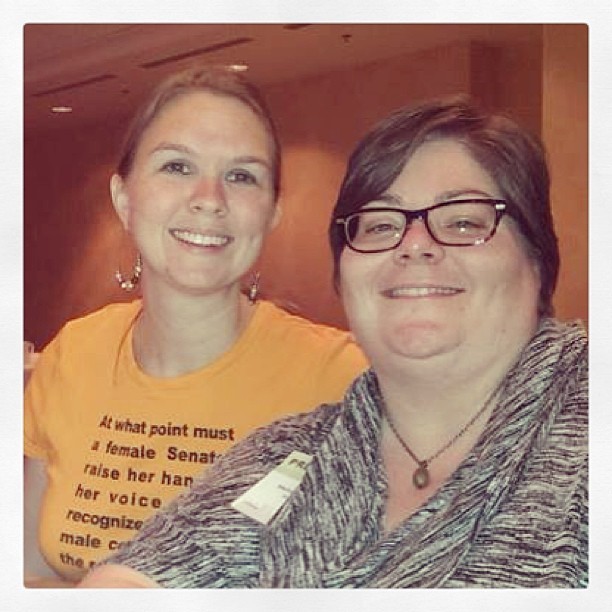
DJL: Who are some feminists you love and why?
JL: This an unfair question because I cannot possibly answer this in any way that will do adequate justice to the many feminists I love. Melissa McEwan, editor-in-chief at Shakesville, is not only a feminist who I model my political, always-trying-to-be-intersectional self after but she is also a dear friend who helps me navigate writing and thinking about difficult stuff when it all seems too much to handle. @Prisonculture and Lauren Chief Elk have both radically altered how I think about criminalization, issues of power around sexual assault, and the fact that white feminists didn’t fucking invent anything. Sydette (@blackamazon) takes me to wonderful places to eat when I visit NYC and daily pushes me to think about the way that race and gender intersect to create specific kinds of oppression for black women in this country. Jos Truitt’s writing opened me up to recognizing my own transphobia so that I now make intentional efforts to not be that person I was only a few years ago. Her writing is always an education for me and I love that about her. Andrea Grimes is a personal friend here in Austin, Texas, who I adore for her integrity, her deep passion for all things Texas, and how she curses no matter in which audience she is.
This is literally just a tiny portion of the feminist community I feel honored to be a part of.



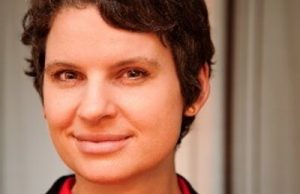

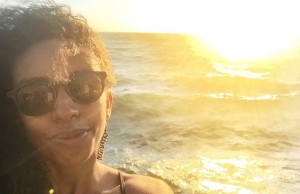
Pingback: "There is no way for me to understand the world I live in unless I take the time to view it through someone else’s lens." | The Penn Ave Post